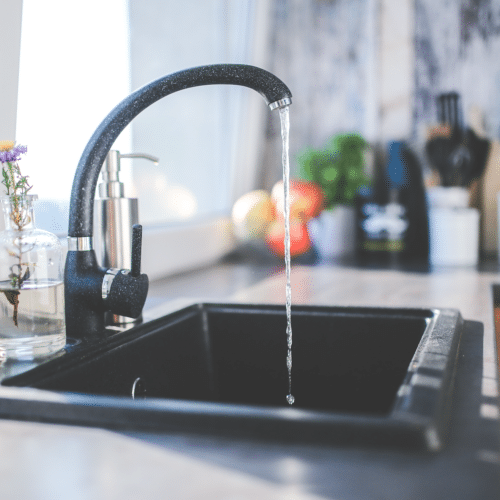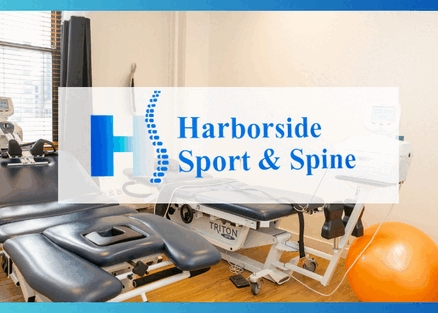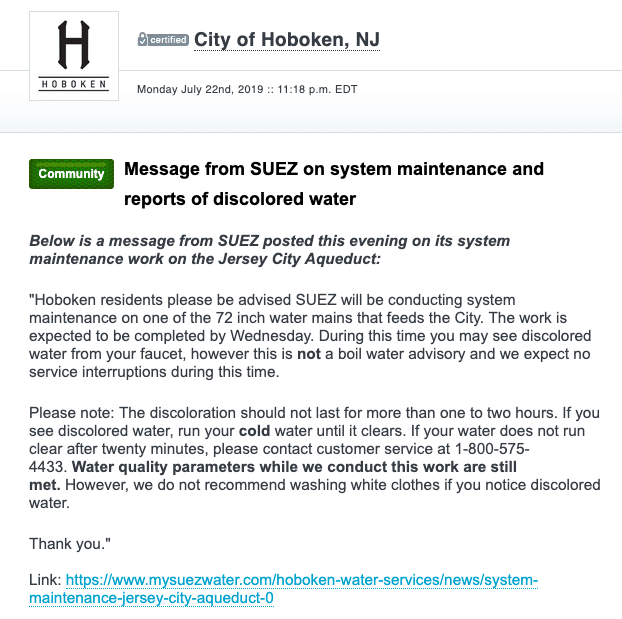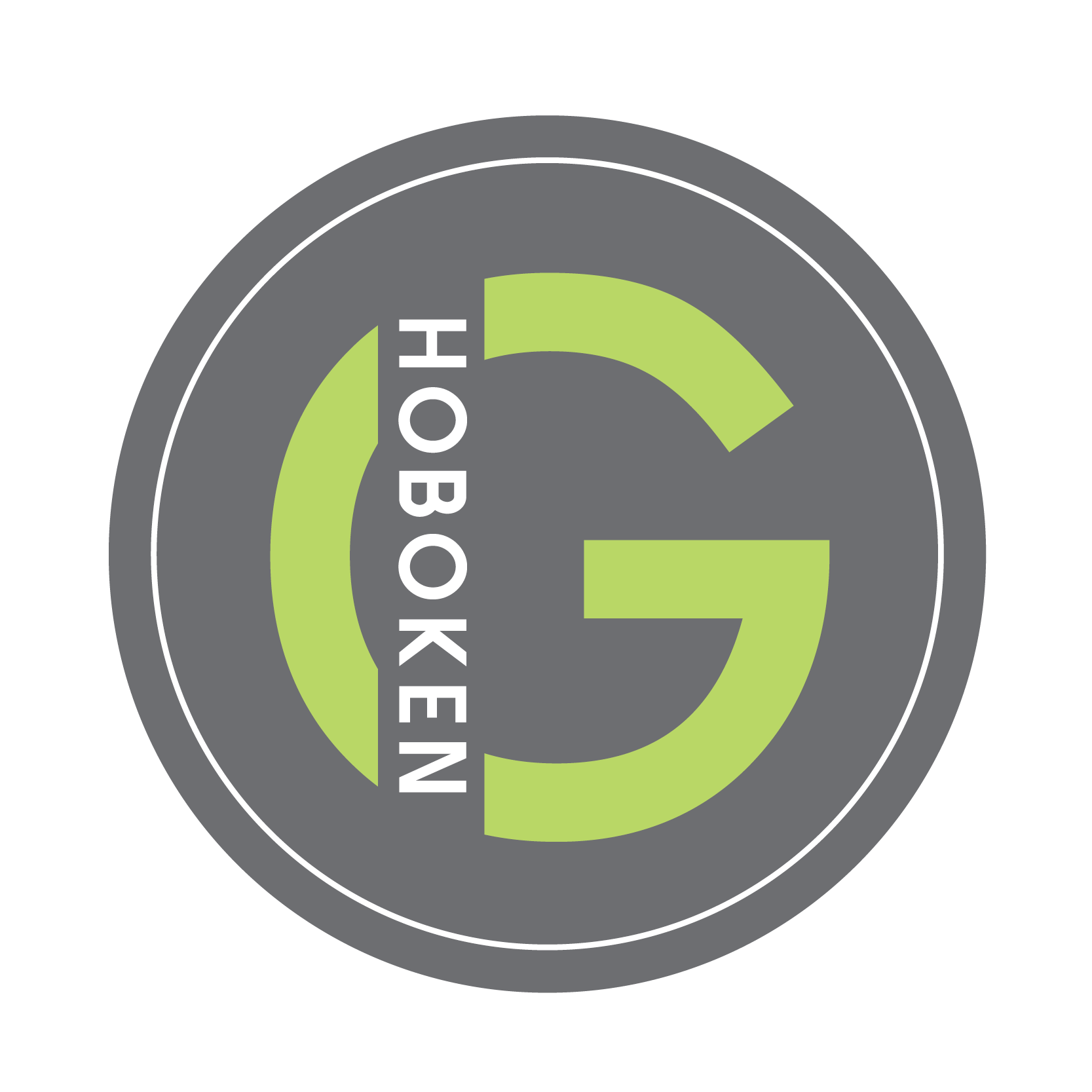UPDATE AS OF 2/12/2020: Thanks to a new bill {S968} passed by New Jersey Senate, we may not have to wonder what’s in our water much longer. Approved in a 39-0 vote, S968 puts a faster deadline on how quickly landlords are required to notify their tenants about dangerous levels of lead in their tap water.
Current regulations do require landlords to notify only new renters about lead; however, long-term tenants do not get the same courtesy, even when the lead in their tap water spike to dangerous levels. Previously, officials had 60 days to alert residents to the presence of elevated lead levels; now, S968 requires landlords to alert residents within 10 days.
Members of our community were appalled after Hoboken resident William Kimmerle publicly posted a picture of the water from his whole-condo water filter to Twitter in August. With everything happening in Newark with lead in their pipes, we knew it was time to investigate – “Is the water in Hudson County safe to drink?” So our founder, Jennifer Tripucka, visited Suez’s Booton Reservoir Plant that sources water to Hoboken + Jersey City to get some more information.
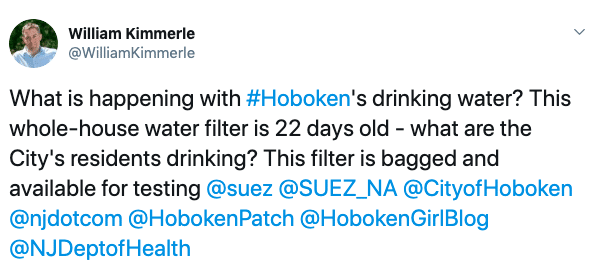
In addition to tagging Hoboken Girl in the tweet, Kimmerle also tagged SUEZ Water, the City of Hoboken’s official account, the New Jersey Department of Health, and other local blogs. The original tweet, which you can see a screenshot, reads: “What is happening with #Hoboken‘s drinking water? This whole-house water filter is 22 days old – what are the City’s residents drinking? This filter is bagged and available for testing.” Of course, this sparked some controversy and posed one very important question — what’s going on with Hoboken’s water? Keep reading to find out what’s been going on with Hoboken and Jersey City’s water, the investigation, + more.
Want to listen to our two-part podcast on this? CLICK HERE
Beyond the Tweet
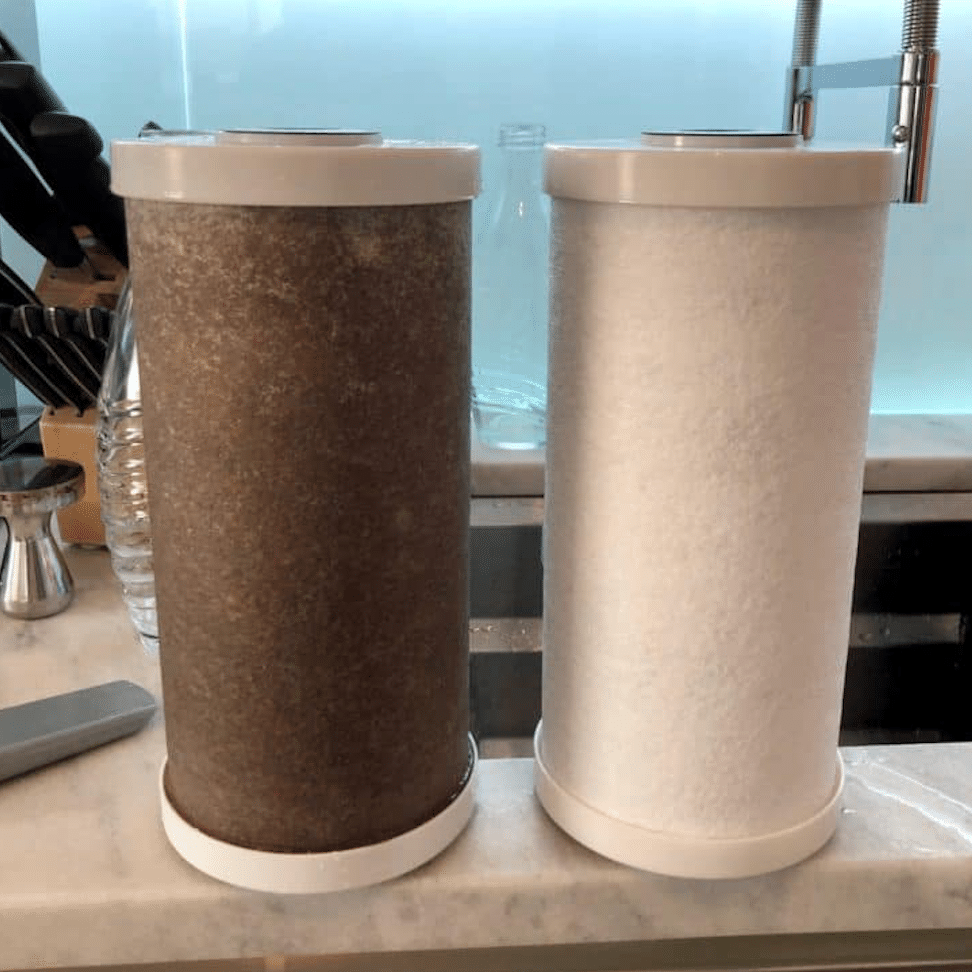
{Photo credit: Twitter}
In addition to the tweet — which disturbed many locals who also drink, bathe in, and use their tap water on the daily — Kimmerle also included some pretty graphic photos of his water.
The tweet caused a great controversy online and garnered several responses, including one from SUEZ who responded, “William, we want to look into what’s going on here. Can you send us a DM with your address so that we can have our team investigate? Thanks – SF.”
The water in Hoboken and Jersey City has been a hot-button issue for quite some time, but now more than ever, Mile Square residents want to get to the bottom of this. What exactly is the state of our drinking, bathing, and ice cube water? Is the water making us sick? Is it making us sicker than we realize?
Hoboken Girl deep-dives into all your Hoboken water questions and more {and you can listen to our podcast episodes about it here and here}.
See More: Recycling in Hoboken + Tips on Reducing Your Carbon Footprint
First, a Mini-Lesson on Hoboken + Jersey City Water
OK, so you live in Hoboken or Jersey City. Let’s start there and break down exactly where our water comes from and who’s responsible for its quality.
Where Does Our Water Come From?
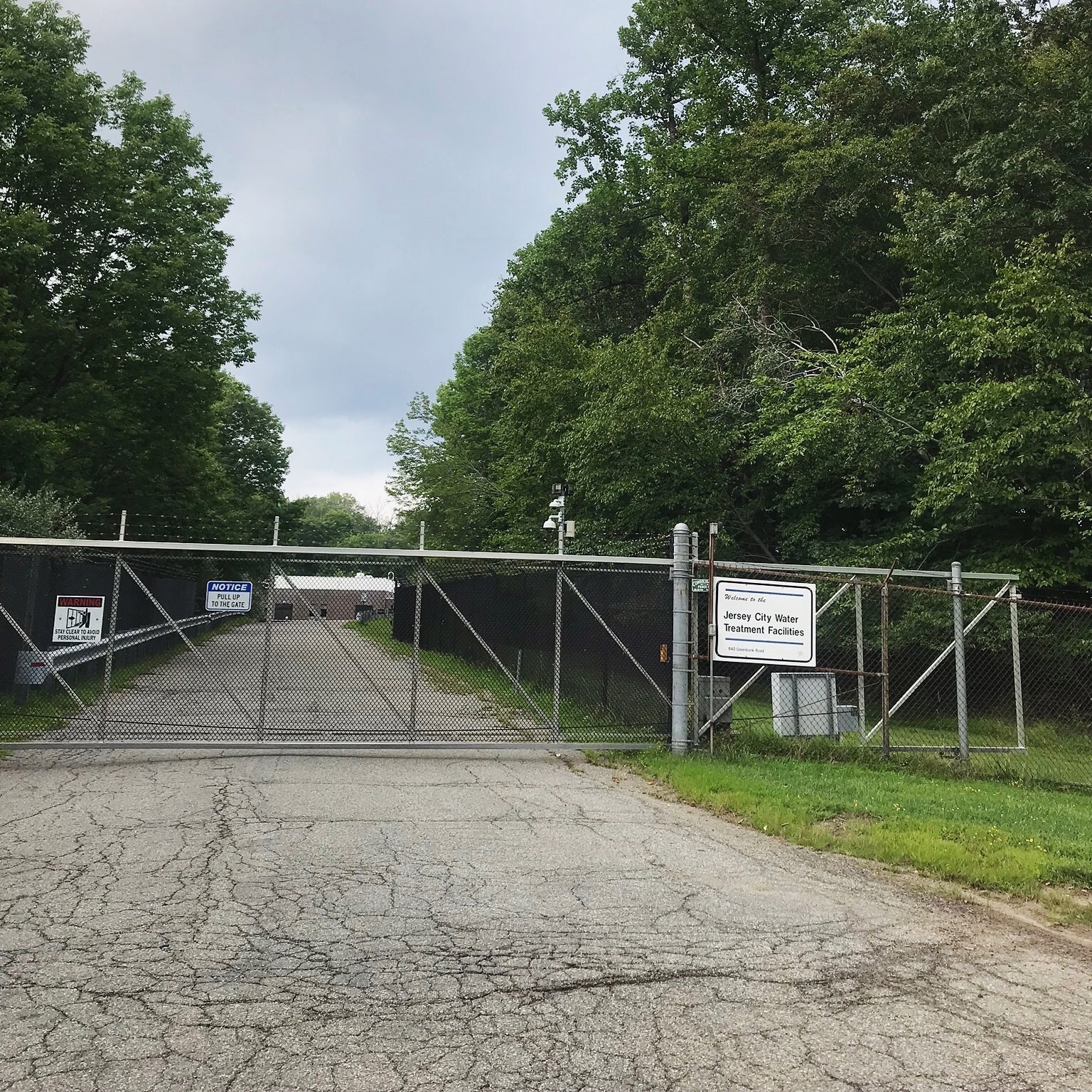
According to a June 2019 PDF called “Your Water Quality Information: Suez, Hoboken Water Services” — available online at mysuezwater.com — the Jersey City Water System supplies water to both Jersey City and Hoboken and comes from the Booton Reservoir in New Jersey. SUEZ Water operates this system.
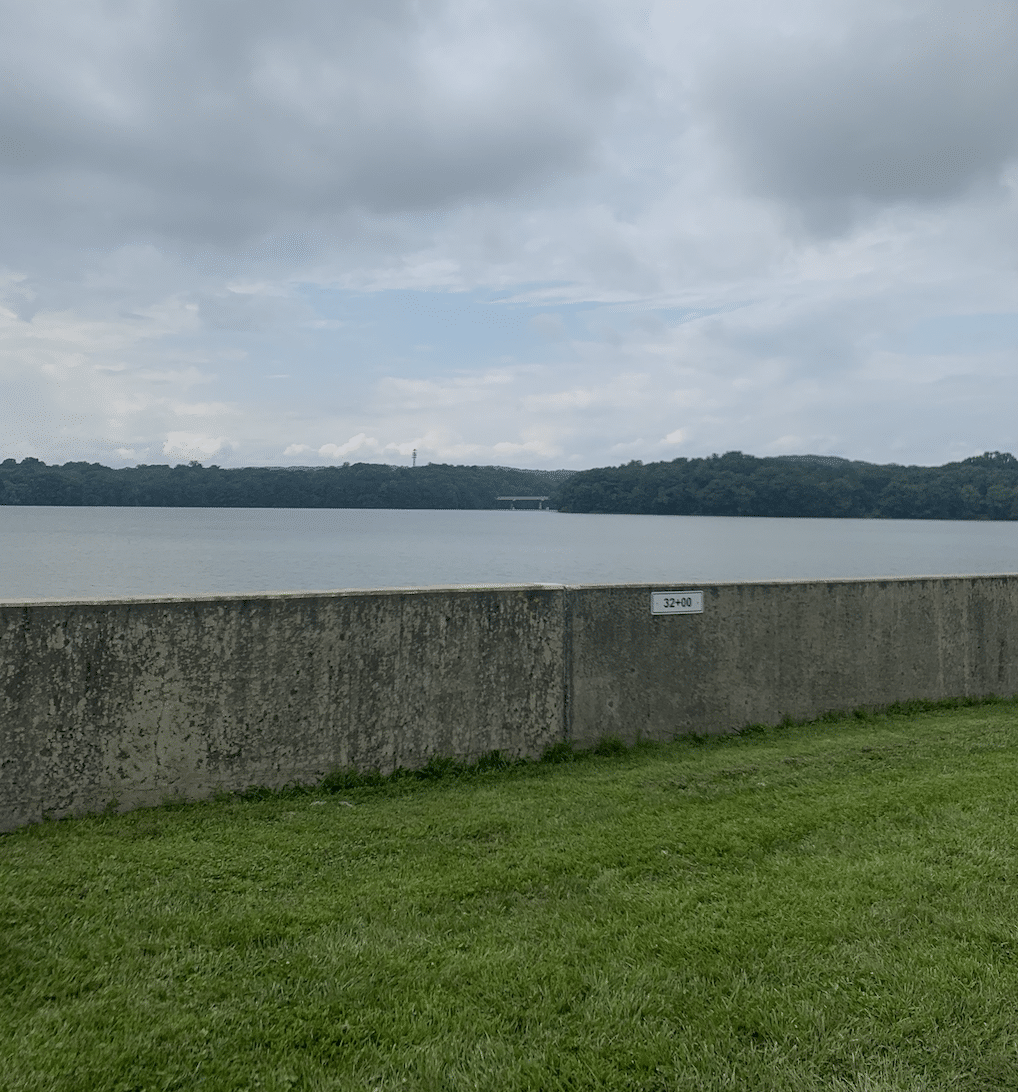
^The Boonton Reservoir
We got a chance to visit the reservoir back in August. Our water comes from one of two reservoirs: Jersey City Reservoir in Boonton and the Split Rock Reservoir in Rockaway Township, both of which are located in Morris County. Those are just the reservoirs though — the actual source is a 120 square-mile watershed, which is the region draining into a river, river system, or other bodies of water. Between the watershed and these two reservoirs, we can store 11.3 billion gallons of water.
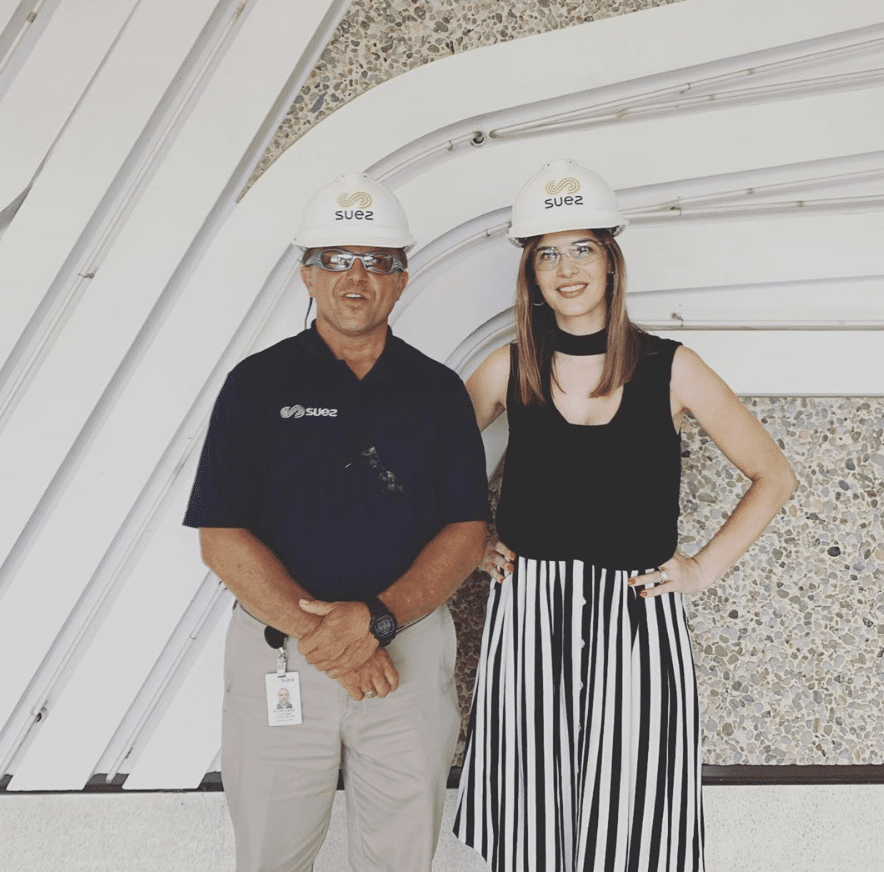
How Does Water Get Purified?
Storing 11.3 gallons of water is not enough. Next, it has to be purified. The Jersey City Water Treatment Plant is responsible for purifying about 50 million gallons of water a day. According to “Your Water Quality Information,” during its peak, Jersey City Water Treatment Plant can purify up to 80 million gallons a day. Listen to our podcast for more on this process here.
The PDF also states that when routine maintenance is performed on the aqueducts, mains, or at the plant, we might receive water from other areas: North Jersey District Water Supply Commission, Passaic Valley Water Commission, the City of Newark, or SUEZ New Jersey Operations.
What’s In Our Water
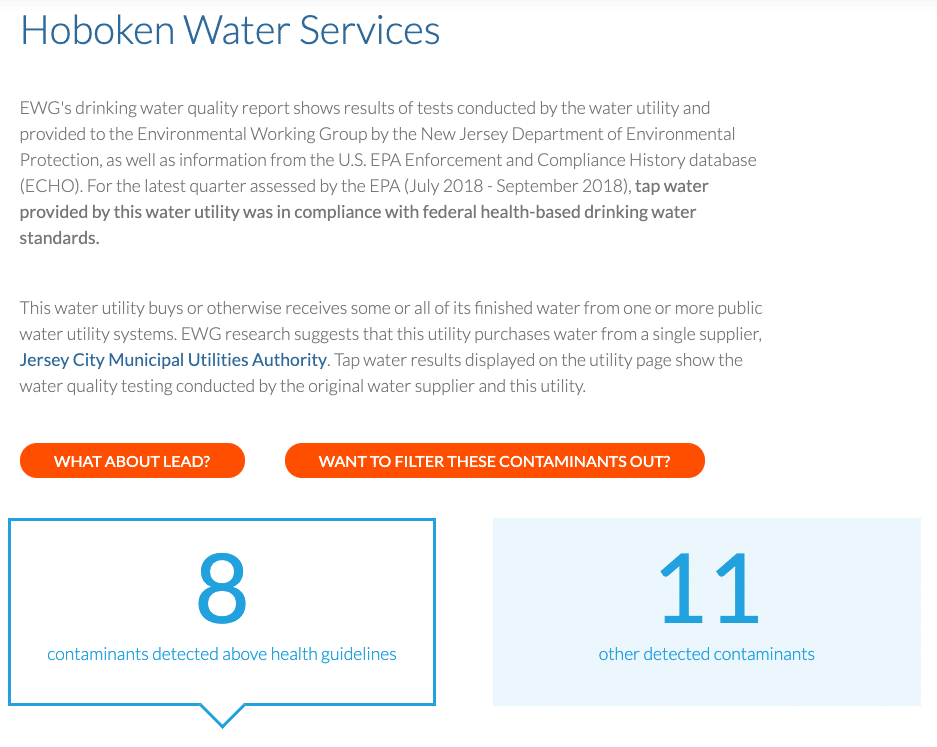
The Environmental Working Group {EWG} offers a free Safe Water Database tool that allows anyone to search the quality of their water using their zip code. Above is what we found while searching zip code 07030.
This report from the EWG Safe Tap Water Database shows results of tests conducted as recently the July 2018-September 2018 quarter. The tap water in Hoboken was found to be in compliance with federal health-based drinking water standards.
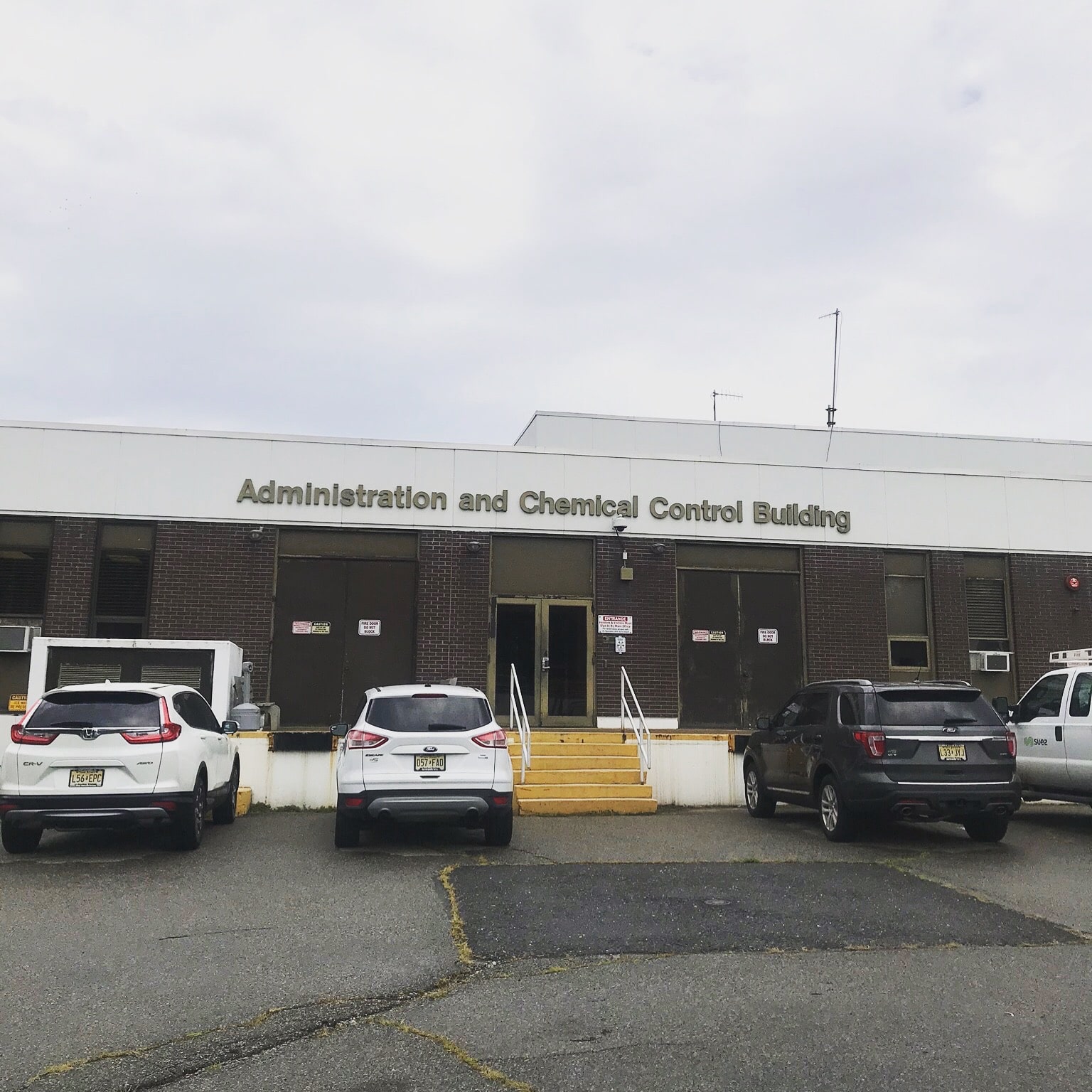
^ SUEZ’s chemical control building.
However, the results also found eight contaminants detected above health guidelines and 11 other detected contaminants. Of the found contaminants is 0.789 ppb of chromium — the cancer-causing contaminant from Erin Brockovich.
This begs the question: Are our “federal health-based drinking water standards” up to snuff? Our water is in compliance and yet, there are eight toxic contaminants detected? Something smells fishy… and it appears to be the government’s water regulations.
The report also states that in 2015, annual utility averages exceeded EWG-selected health guidelines established by federal or state public health authorities. Below, the chemicals detected in 2015 are included among the eight contaminants found in Hoboken’s tap water. {Note: all eight of the detected contaminants are known cancer-causing agents, AKA carcinogens.}
Bromodichloromethane
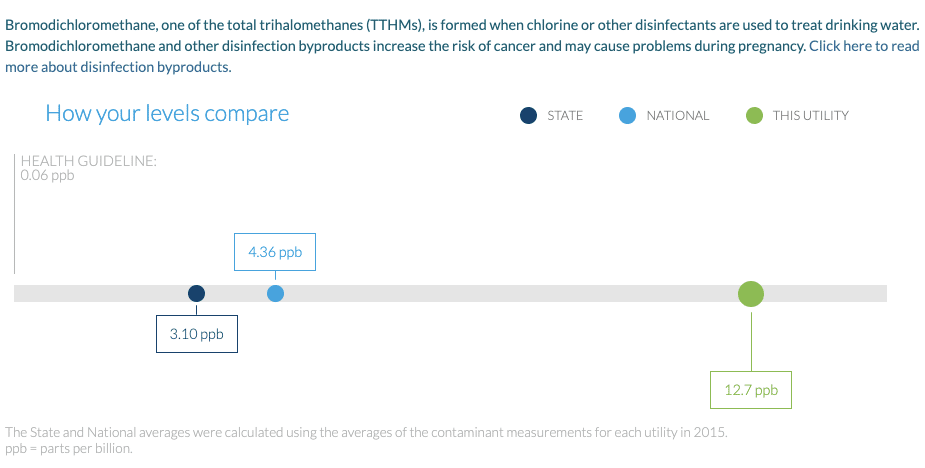
Chloroform
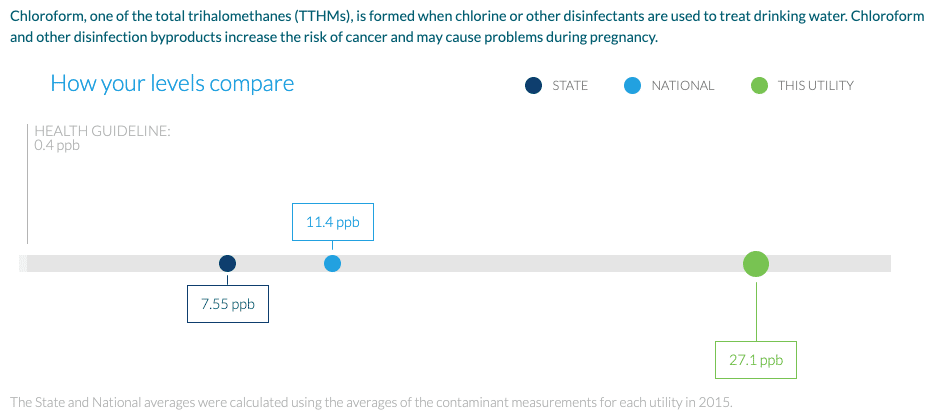
Chromium (hexavalent)
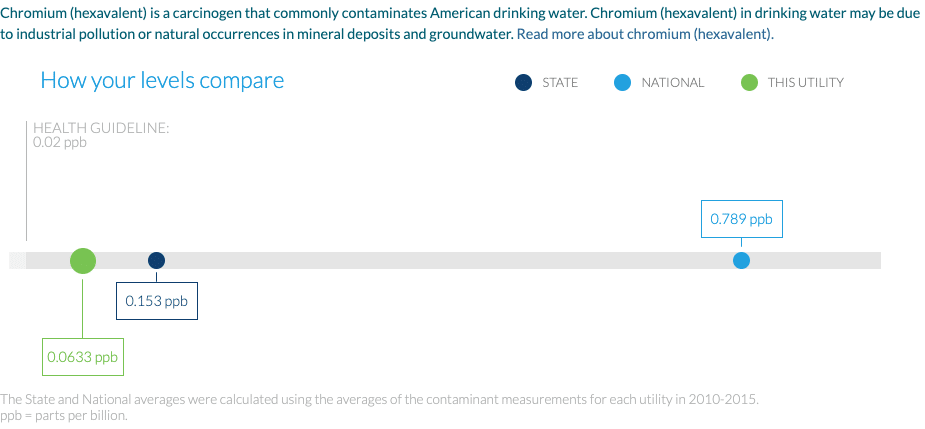
Dibromochloromethane
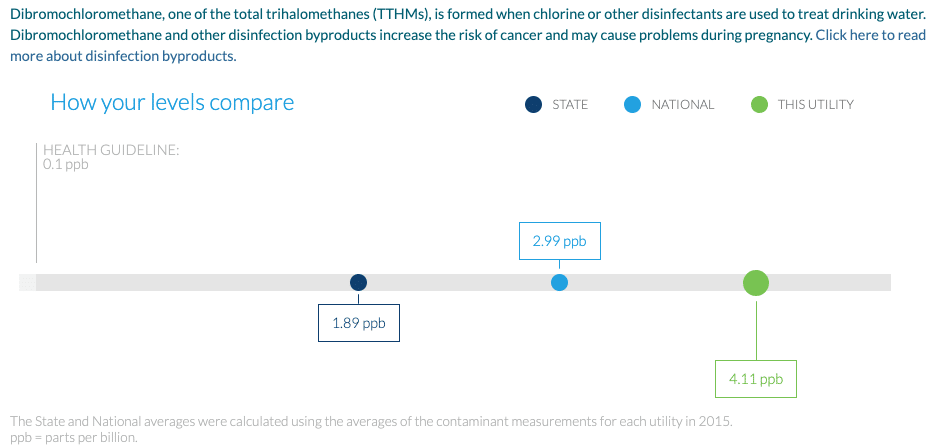
Dichloracetic acid
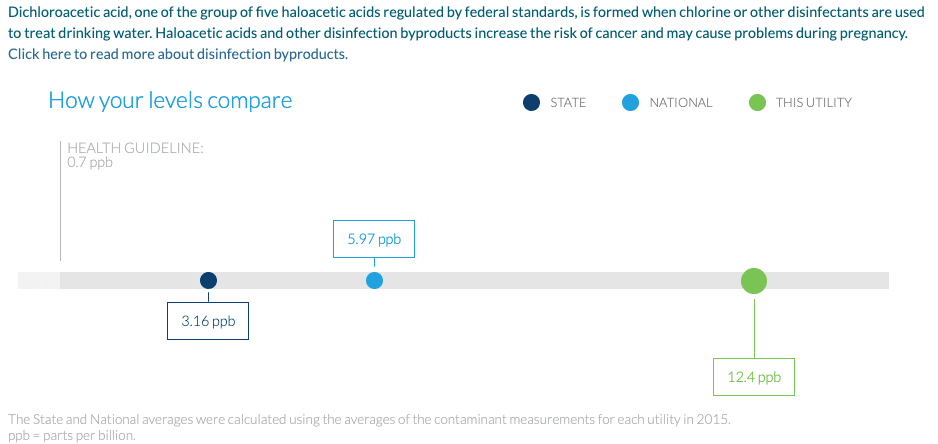
Total trihalomethanes (TTHMs)
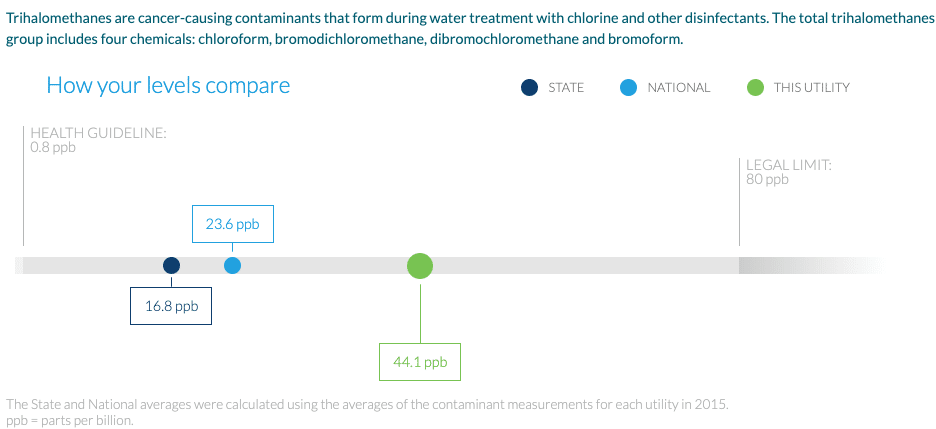
Trichloroacetic acid
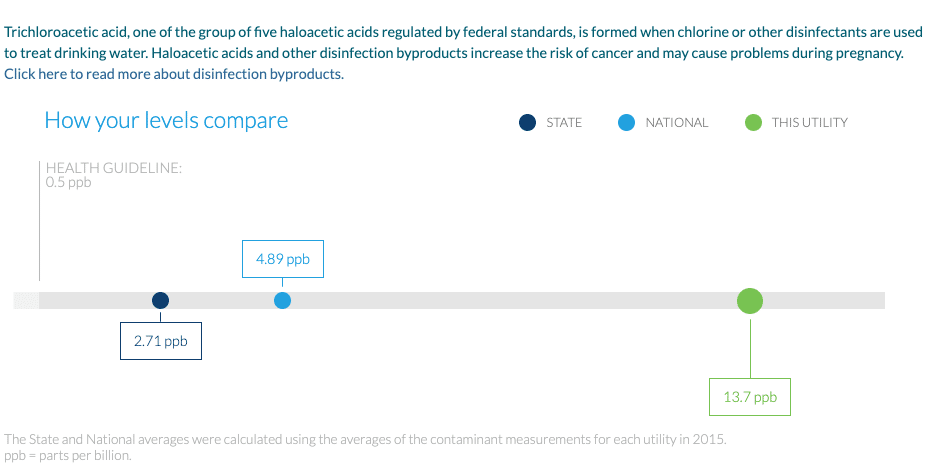
Nitrate and Nitrite
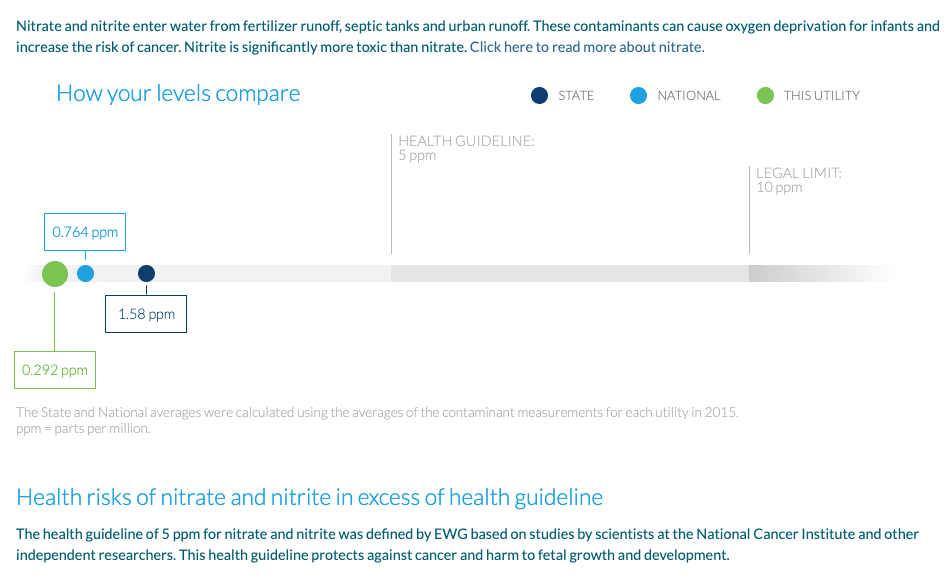
SUEZ’s Response
We visited SUEZ and were happy to see that they really take every precautionary measure to make sure our water is safe. More on that here.
Hoboken Girl spoke to Chris Riat at SUEZ, who maintained the information obtained from EWG is “in error.”
Riat says:
I’ll be honest, I’ve found the EWG’s reporting to be in error in many of our systems. And I don’t know, a number of times we’ve given them information over and over again and I’ve not seen it reported correctly. I don’t know if that’s an issue in bias or a mistake in reporting, but I would always go with what the state reports because we have to provide and certify everything to the state. The state requires us to take that exact information and put it in our CCR. I would always go to the CCR in any water system. I would not rely on a third-party that has no accountability to the public. The state has an accountability issue to the public. They do not allow us to misrepresent test results. The EWG has no accountability.
Riat then pointed Hoboken residents to the 2017 and 2018 CCRs, which can be accessed below.
According to both CCRs, SUEZ waived its right to test for asbestos and synthetic organic chemicals {SOCs} in our water under the Safe Drinking Water Act {SDWA}. The PDF states, “We have the asbestos waiver because we do not have any asbestos cement pipes in the distribution system. We have the synthetic organic chemicals waiver because we are not vulnerable to this type of contamination.”
This, of course, is not the first time Hoboken’s water has been under investigation. High levels of chromium in New Jersey’s water made headlines back in 2016. At the time, David Andrews, co-author of the report, said, “Americans deserve to know if there are potentially harmful levels of a cancer-causing chemical in their tap water.”
Then as of January 2019, SUEZ was under fire after elevated levels of lead were found in the water of Bergen County and Hudson County homes. According to NorthJersey.com, SUEZ found high levels of lead in 16 of 108 tested homes in the second half of 2018. It is the highest amount SUEZ has ever recorded.
At the time, SUEZ said the lead contamination likely came from infrastructure: pipes that come from the water mains under the streets and lead fixtures within the actual homes. When speaking with them at their plant, they also mentioned this as the source of any lead – the service lines within the buildings, rather than the actual pipes the water flows through. This leads to a very important point: Check with your buildings on the service lines. SUEZ is doing its job as far as water quality and meets all standards currently — as residents we must stay in the know and advocate for ourselves within our own neighborhoods.
We also checked with the City of Hoboken about service lines and the old piping in Hoboken that may need some updating, Here’s what Director Jennifer Gonzalez said: ”
“The $33 million in water main upgrades will complete Hoboken’s Water System Renewal Plan. A map and the plan are here: https://www.hobokennj.gov/resources/hoboken-water-system. The locations for water main upgrades in the Plan were prioritized for various reasons including age, risk of breaks, history of breaks, and other factors. While the Plan is our current guide, the amended agreement with Suez will allow the City to re-evaluate the locations for water main upgrades annually through a risk-based prioritization process. As a result, the locations may change slightly because they will be based on the best available data at the time they are selected for design.
We are about to break ground on Phase 1 of the water main upgrades (purple on the map), which were funded before the Suez agreement by a bond ordinance. Phase 2 is currently under design and we plan to break ground on those in 2020.”
A recent follow-up {as of July 2019} found that lead levels in Hudson County’s water decreased, now technically meeting the federal health standard for the toxic metal in our water. The federal standard for lead in county water is 15 parts per billion. Water samples from SUEZ as of July 2019 showed readings at 15.4 parts per billion, just making the cut.
Back to That Brown Water in the Filter…
Hoboken Girl reached out to William Kimmerle, who lives in West Hoboken. Here’s what he had to say about his water and why he tweeted:
“My investigation of this started due to HVAC – our heating system began having problems within the last year and it ultimately failed. Without going too far into detail, the cause of our issues was the 3” of sediment that had built up in our water heater,” Kimmerle says via email. “$15k later we had a new hot water tank and HVAC system, and we installed a whole-house filter to prevent sediment from the city system destroying our new hot water heater.”
Sadly, that wasn’t the end of Kimmerle’s water troubles throughout his home.
“Since then, I have replaced the filter five times, approximately every one and a half to two months, due to incredible amounts of red sediment that is coming in via our incoming water service. It happens in a single jolt – one day the filter is pink {slowly accumulating} and the next it is deep brick red {typically corresponding to street repairs},” Kimmerle adds.
Read More: Hoboken Bans Styrofoam in Unanimous City Council Vote
Here’s What Happened According to SUEZ
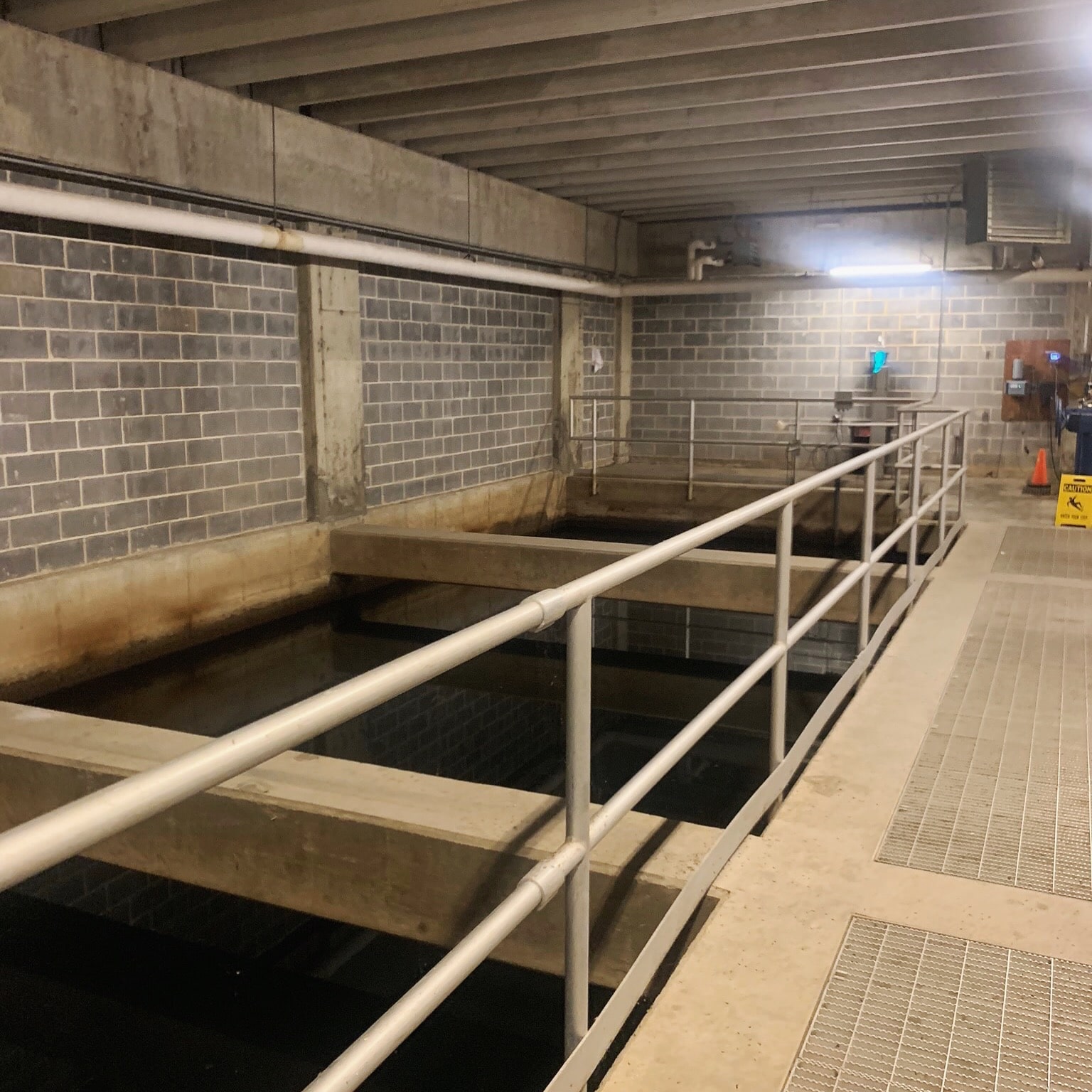
^ Inside SUEZ treatment facility.
Hoboken Girl reached out to Chris Riat at SUEZ and also the team at the SUEZ plant who cleared up some of the confusion about what happened. According to Riat, there was an ongoing leak in one of the two 72″ aqueducts that brings water about 27 miles from the reservoirs to Hoboken. The ongoing leak occurred in Clifton, which Hoboken’s water has to pass in order to get here.
Riat says:
“As you know a filter is in place and while it’s in place, if it’s doing its job that it’s supposed to do, it will capture any solids that are in the water. At a period of time, and in this case it was Monday, July 24, there are two 72” inch aqueducts that take the water from the plant. Hoboken is served by the Jersey City system. The actual water treatment plant is up in Boonton, New Jersey. Then the aqueduct comes down 20-something miles into Jersey City and then into Hoboken. The aqueduct consists of two aqueducts. There was a link in Clifton on one of the 72”s. The whole Hoboken water supply is in jeopardy when you have a leak on the aqueducts. So, prior to the repair we did a partial shutdown on that Friday.
The leak was ongoing, and we fixed the leak on July 24. That’s when you had a discolored water event in Hoboken. In repairing the aqueduct, you have to shut it down. When you shut it down, you can imagine the amount of water that is required to feed Jersey City and Hoboken. When you shut it down and start it back up, you stir up a lot of sediment. Sediment is recurring minerals in water that over time settles out in something large like a 72-inch aqueduct. So, in bringing that aqueduct line back up, it stirred up the sediment and caused a discolored water event in Hoboken. Now, if that filter, it’s very possible the homeowner didn’t notice it at the time because the filter was doing its job. Others when you don’t have a filter, you obviously notice it right away. When you notice it right away you either go online or call the water company and the company will tell you what to do which is, if you have a multiunit house or a multi-floor house, go to the lowest. Don’t use the hot water because you’ll only drag the discolored water into the hot water heater. Use cold water, go to the lowest faucet in your house, and run the faucet until the water is clear. In this case, that may not have happened because he had the filter.
The good news is that the filter did its job. The bad news is it was there and they weren’t aware of the discolored water event at the time.
But again, the water was safe to drink at all times within state standards. Obviously, aesthetically it’s not pleasant to look at and when you pour it from the tap, most people wouldn’t like to drink it.”
When asked if the water was safe to drink even though discolored, Riat explained that brown color was sediment.
Riat explained:
“It’s actually minerals in the water. Water is made up of naturally occurring minerals. When you buy a Dasani, you’re buying water that had minerals added into it. Those minerals will settle. That’s what you’re stirring up in these aqueducts, which have been in use for many years and have had the opportunity for sediment to form.”
Riat also said that since the maintenance in Clifton was planned work, a notification was sent out online, two days before the repair. SUEZ issued a public notice on Facebook {and on its website}, letting residents know of a report of discolored water. See the alert in its entirety above.
The report alerts residents to the potential of noticing discolored water as a result of the system maintenance. It reads:
Hoboken residents please be advised SUEZ will be conducting system maintenance on one of the 72-inch water mains that feeds the City. The work is expected to be completed by Wednesday. During this time you may see discolored water from your faucet however this is not a boil water advisory and we expect no service interruptions during this time.
Please note: The discoloration should not last for more than one to two hours. If you see discolored water, run your cold water until it clears. If your water does not run clear after twenty minutes, please contact customer service at 1-800-575-4433. Water quality parameters while we conduct this work are still met. However, we do not recommend washing white clothes if you notice discolored water.
Solution Options for Avoiding Contaminants in Our Water
What’s a person with a desire for clean, healthy water to do? We didn’t want to report on all the bad without giving you some sort of silver lining. Here are a few things you can do to avoid contaminants in our water.
- Run your tap water for at least a minute to ensure it is clean and flushed of any impurities. According to SUEZ, it is 100% safe to drink. Listen for more on that here.
- If wanting more, use a charcoal purifier. Charcoal is an all-natural purifier. Just one of these charcoal sticks from Amazon can purify up to one gallon of water, providing up to three or more months of purified water before you’d need to buy another. It absorbs impurities — like chlorine, for example, which is used to filter our water — by attaching to the toxins’ negative ions and removing them. It also adds healthy nutrients like magnesium, iron, and calcium to your water.
- Invest in an alkaline water membership. Rica Water is a purified and alkaline water service that provides patrons with a membership to already filtered, alkaline water. It’s based in Englewood, New Jersey and they supply water with more than an 8.0+ pH to your home for pickup.
- Buy a filter that’s up to EWG’s standards. In addition to the Environmental Working Group providing a Safe Tap Water Database, their website also offers valuable information about how to choose a quality water filter. Check out their Filter Buying Guide here.
- Invest in a shower filter. Why drink alkaline water, but then bathe in toxic water? After all, our skin is our biggest organ. If we drink healthy water, then we should bathe in it, too. A shower filter filters out toxins like sediment, Chlorine, pesticides, pharmaceuticals, and more.
- Listen to our podcast part two for more on this topic.
Is Drinking Bottled Water a Solution if Still “Nervous” About Tap Water?
Not, really, no. Drinking bottled water has its own set of issues. According to “Your Water Quality Information:”
Drinking water, including bottled water, may reasonably be expected to contain at least small amounts of contaminants. The presence of contaminants does not necessarily indicate that the water poses a health risk.
One of the health risks associated with drinking bottled water is plastic leaching. Since bottled water is most often packaged in single-use plastic packaging, the chemicals inside of the plastic bottle can actually seep out of the bottle and into the water itself, causing you harm. Plastic leaching is associated with increased risks of infertility, cancer, allergies, and more. The risk for plastic leaching increases when the plastic container rises in temperature. So, if you leave a full water bottle in your car and then come back to it later after it’s baked in the sun, you can almost guarantee there’s some plastic leaching going on.
In addition to plastic leaching, traditional methods of bottling water include processes like extreme filtration and ozonation, which turns tap water into super-processed “bottled” water. According to The Alternative Daily, the Environmental Protection Agency and Environmental Working Group have “determined through lab testing that bottled water is inferior to tap water.”
Why? Bottled water companies use processes like ion-exchange, reverse osmosis, distillation, and de-ionization to bring their water up to filtration standards. But that’s not a good thing. These processes are actually harmful to our health and it results in something called “dead water.”
Dead water is water that has been stripped of all its natural minerals and nutrients that support our health; dead water also kills the tissue and cells in your body, overtime killing the organism itself.
Not to mention, this filtered and super-processed water is going into plastic water bottles. Even if the pH of the recently sanitized water is on the more alkaline side, just sitting in the plastic bottle alone will reduce its nutrients and quality.
How Can I Get My Water Tested and Make Sure It Is Safe?
- Go online to Suez’ website. The reps for SUEZ mentioned that you can go to mysuezwater.com if you want to find out about any water quality reports on the SUEZ line.
- Google drinking water watch. This is a site ndependent of SUEZ so that you can compare and contrast and see that everyone is in compliance. That site is run by the NJ Dept of Environmental Protection. When you get to the site you can type in your zip code for NJ.
- Call the Bureau for Safe Drinking Water at 609-292-5550 with any concerns or questions.
- Call a water laboratory testing facility. Click here for the EPA’s guide to testing.
What do you make of all this? It’s a lot to swallow — pun intended.
Let us know your thoughts in the comments below!

